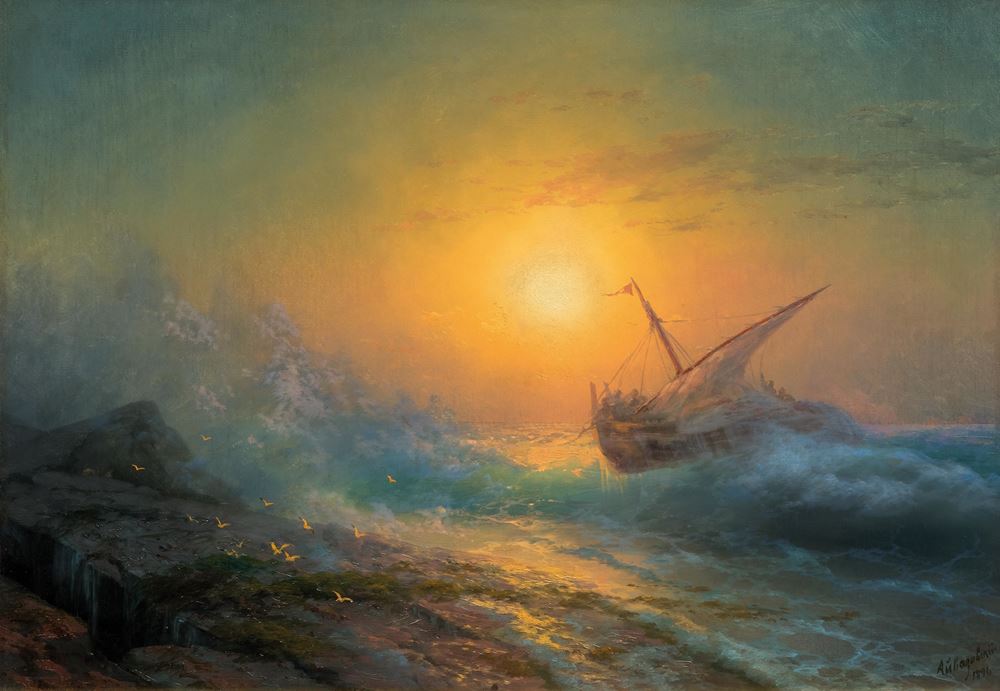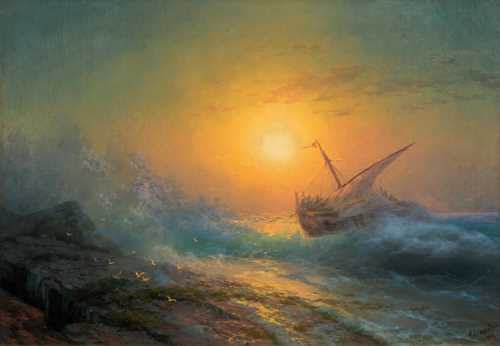
Lot 3218* - A180 19th Century Paintings - Friday, 31. March 2017, 03.30 PM
IVAN KONSTANTINOVICH AIVAZOVSKY
(1817 Feodosija 1900)
Stormy sea at sunset. 1896.
Oil on canvas.
Signed in Cyrillic lower right and dated: 1896. Also signed and dated on the reverse canvas: 1896.
68 × 99 cm.
Provenance:
- An Armenian family collection, acquired directly from the artist by the great-great-grandfather.
- European private collection, acquired from the above-mentioned family.
Literature:
Caffiero, Gianni and Samarine, Ivan: Unknown Aivazovsky, Moscow 2016, cat. no. CS-1896-004, p. 415, ill. p. 277.
The painting will be included in the catalogue raisonné of the paintings of I. K. Aivazovsky currently in preparation by Gianni Caffiero and Ivan Samarine.
It is with particular pleasure that we offer this magnificent marine painting by Ivan Konstantinovich Aivazovsky, in this year which marks the two hundredth anniversary of the artist’s birth. The work was recently rediscovered in a European private collection, and is a significant addition to the artist’s oeuvre.
Aivazovsky succeeded as no other in capturing the elements of nature on canvas in such a realistic and dramatic manner, and to vitalize them through luminosity and virtuosity in the use of transparency and colour. The Russian art critic Vladimir Stasov wrote: “The marine painter Aivazovsky is, by nature and through his exceptional talent, a remarkable artist, who was able like perhaps no other in Europe to vividly sense the beauty of water and to render it in his unique manner” (Stasov, Vladimir: Selected Works in 3 Volumes, vol. 3, Moscow 1952, p. 669).
The 19th century is considered to be the golden age of Russian painting. European artistic movements also had an influence on Russian artistic development, and by the middle of the century Realism had superseded Romanticism. Aivazovsky did not allow himself to be led by this trend, however, and remained true to the Romantic manner of painting. Neither did he wholly turn towards Impressionism, although in the early 1890s one can detect a certain tendency to use intensive colours and the application of rapid brushstrokes, which are also apparent in the present work.
Aivazovsky often repeated his motifs several times, however this particular scene is unique, and no other version of it is known to exist. Early on in his career, Aivazovsky depicted the sea predominately in a calm and peaceful state, while during his maturing phase and in later works the more dramatic side of nature was brought to the forefront. This is particularly evident in this stormy marine painting. The sea’s wild waves crash against the rocky coast and pile up before the sky, lit with the rays of the setting sun. Silhouetted in white is a flock of sea birds, rendered with such movement and delicacy that they inject a note of light-heartedness and aplomb into the scene. The vessel struggling against the waves can be identified as a Viking ship. During the 19th century, Vikings were romanticised, and elevated from their former role of pirates to become celebrated as valorous heroes of the sea. Aivazovsky, who had a keen business sense alongside his artistic skill, spoke directly to the Russian soul with this painting.
- An Armenian family collection, acquired directly from the artist by the great-great-grandfather.
- European private collection, acquired from the above-mentioned family.
Literature:
Caffiero, Gianni and Samarine, Ivan: Unknown Aivazovsky, Moscow 2016, cat. no. CS-1896-004, p. 415, ill. p. 277.
The painting will be included in the catalogue raisonné of the paintings of I. K. Aivazovsky currently in preparation by Gianni Caffiero and Ivan Samarine.
It is with particular pleasure that we offer this magnificent marine painting by Ivan Konstantinovich Aivazovsky, in this year which marks the two hundredth anniversary of the artist’s birth. The work was recently rediscovered in a European private collection, and is a significant addition to the artist’s oeuvre.
Aivazovsky succeeded as no other in capturing the elements of nature on canvas in such a realistic and dramatic manner, and to vitalize them through luminosity and virtuosity in the use of transparency and colour. The Russian art critic Vladimir Stasov wrote: “The marine painter Aivazovsky is, by nature and through his exceptional talent, a remarkable artist, who was able like perhaps no other in Europe to vividly sense the beauty of water and to render it in his unique manner” (Stasov, Vladimir: Selected Works in 3 Volumes, vol. 3, Moscow 1952, p. 669).
The 19th century is considered to be the golden age of Russian painting. European artistic movements also had an influence on Russian artistic development, and by the middle of the century Realism had superseded Romanticism. Aivazovsky did not allow himself to be led by this trend, however, and remained true to the Romantic manner of painting. Neither did he wholly turn towards Impressionism, although in the early 1890s one can detect a certain tendency to use intensive colours and the application of rapid brushstrokes, which are also apparent in the present work.
Aivazovsky often repeated his motifs several times, however this particular scene is unique, and no other version of it is known to exist. Early on in his career, Aivazovsky depicted the sea predominately in a calm and peaceful state, while during his maturing phase and in later works the more dramatic side of nature was brought to the forefront. This is particularly evident in this stormy marine painting. The sea’s wild waves crash against the rocky coast and pile up before the sky, lit with the rays of the setting sun. Silhouetted in white is a flock of sea birds, rendered with such movement and delicacy that they inject a note of light-heartedness and aplomb into the scene. The vessel struggling against the waves can be identified as a Viking ship. During the 19th century, Vikings were romanticised, and elevated from their former role of pirates to become celebrated as valorous heroes of the sea. Aivazovsky, who had a keen business sense alongside his artistic skill, spoke directly to the Russian soul with this painting.
CHF 380 000 / 550 000 | (€ 391 750 / 567 010)
Sold for CHF 825 500 (including buyer’s premium)
All information is subject to change.

